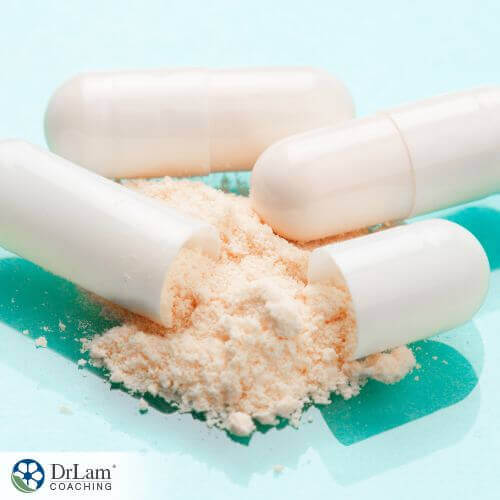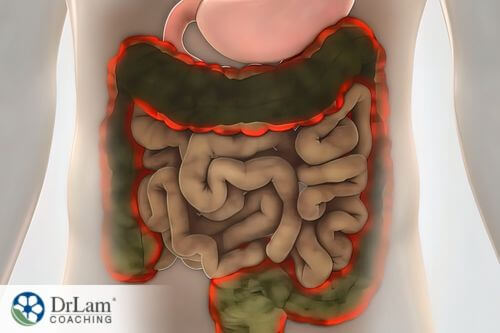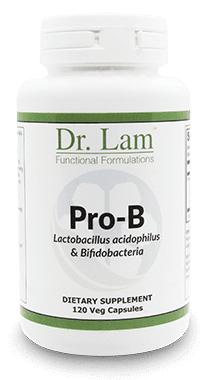For a long time, the gut was only thought of as the place where digestion and elimination occurred. But recent scientific studies have shown that it plays a vital role in your immune health and even the health of your brain. But taking care of your gut isn’t easy, and there’s a lot of conflicting information out there about it. One of the most common pieces of advice is to take a daily probiotic, but even that advice has opposition. To help you make the right decision for your gut and your health, here’s what the latest research says.
 A probiotic is a substance that contains live, beneficial microorganisms. They’re usually made up of a mixture of live bacteria and yeasts that naturally live in your body.
A probiotic is a substance that contains live, beneficial microorganisms. They’re usually made up of a mixture of live bacteria and yeasts that naturally live in your body.
Probiotics are especially important to gut health. Your gut is filled with countless bacteria, some of them good and others not so good. It is important that the bacteria in your gut are in balance, with the bad kept in check by the good. Unfortunately, this balance is often lost through factors like a poor diet, not enough dietary variety, antibiotic use, chemicals, inactivity, and alcohol consumption.
This is why you need probiotics, to supply your body with good bacteria that help keep it healthy and functioning properly. Probiotics perform a number of essential functions in your body. They:
That’s why, if you have gut problems, a poor diet, or take lots of medications, then you may need to think about taking a daily probiotic.
There’s conflicting evidence about whether you should take a probiotic. The best route is to get the probiotics you need from the foods you eat. This helps ensure that your probiotics are live, active, and well fed. Also, probiotic foods contain vastly more probiotics than supplements. Some foods that contain probiotics are:
However, some diets make it difficult to get adequate levels of the right kinds of probiotics without a supplement. There are many different kinds of probiotics, and there are also key strains that will help support your gut health and the growth of good bacteria. There are also specific strains that are best for specific health problems, which is why you may need a doctor's help to choose the right one. Probiotic supplements usually contain strains of bacteria that studies have shown to be most beneficial for your health. These strains are Lactobacillus and Bifidobacterium. Most supplements also contain yeast, which may also have additional health benefits.
Taking these supplements regularly will ensure that your gut contains beneficial bacteria all the time. This can help you heal from health problems associated with poor gut health. It may also help protect you against future threats to your gut bacteria.
It is generally safe to take a daily probiotic. However, you should always talk to your doctor before taking any kind of supplement, just to make sure that it won’t harm your health. You should be even more cautious if you have a weakened immune system, as this might affect how your body reacts to probiotics.
Try to avoid taking too many probiotics as well, as this may cause constipation or other gut problems such as gas or diarrhea.
 Different brands of probiotic supplements contain different amounts of bacteria. Some have very high amounts, so you’ll only need to take them once a day. With other supplements, you’ll need to take them twice a day.
Different brands of probiotic supplements contain different amounts of bacteria. Some have very high amounts, so you’ll only need to take them once a day. With other supplements, you’ll need to take them twice a day.
The dosage of probiotics you should take will depend on your gut environment and the health benefits you’re hoping to experience. The dosage of these supplements is measured in what’s known as colony-forming units (CFUs). Generally speaking, most high-quality probiotics contain between 1 million and 1 billion CFUs.
It’s important that you don’t just choose the probiotic with the most CFUs or combine them in the hopes of compounding the effects. This may cause the different strains to inhibit each other or prevent them from working together to give you the benefits you’re looking for. Instead, you need to talk to your doctor and research the health benefits that you’re looking for. This will help ensure that you buy a high-quality product that matches your needs.
You should also read the intake instructions on your chosen probiotic very carefully before taking them. Many probiotics need to be taken on an empty stomach to support the health of the live bacteria in your gut. Failing to do so could cause the bacteria to die, making the supplement useless.
Note also that many probiotics need to be refrigerated. Improper storage could also kill off the beneficial bacteria.
A daily probiotic may be very helpful when you have Adrenal Fatigue Syndrome (AFS). This disorder can occur when you’re under constant, ongoing stress. Usually, when you’re stressed, it activates the NeuroEndoMetabolic (NEM) stress response. This prompts the adrenal glands to produce cortisol, which then makes changes in the six circuits (composed of related organ systems) of the NEM stress response. These changes help your body respond to a stressor. Once the stressful situation is over, cortisol levels are meant to go back to normal. This allows the NEM stress response to shut down so that the involved organs can return to their normal tasks in your body.
When you’re stressed over the long term, however, this system becomes overused and does not shut down. The adrenal glands fatigue because of the ongoing high workload and can struggle to keep up with the demand for cortisol. The NEM stress response and its circuits can also become unbalanced and dysfunctional because of the ongoing high cortisol levels.
This can lead to multiple, worsening symptoms involving the entire body as the different circuits develop problems. Issues with the Inflammation Circuit in particular can be very frightening and difficult to manage.
The Inflammation Circuit can become severely impacted when you have AFS, and a daily probiotic may help with this. This circuit consists of the gut, the immune system, and the microbiome, or the balance of bacteria in the body. As AFS sets in, the separate components of this circuit become unbalanced, causing a variety of troubling health problems.
This kind of imbalance results in an overactive immune system and rampant inflammation. It also affects gut health and the balance of bacteria in your body. You may start to experience gut problems such as constipation, diarrhea, or poor absorption of nutrients when this occurs.
 The bacterial balance in your gut and in the rest of your body will be impacted as well, with the bad bacteria flourishing and overwhelming the good. This can result in a build-up of toxins as well as a leaky gut, which will allow toxins from the gut to flow back into the bloodstream. This will further tax the immune system, which creates more inflammation in order to fight these harmful invaders.
The bacterial balance in your gut and in the rest of your body will be impacted as well, with the bad bacteria flourishing and overwhelming the good. This can result in a build-up of toxins as well as a leaky gut, which will allow toxins from the gut to flow back into the bloodstream. This will further tax the immune system, which creates more inflammation in order to fight these harmful invaders.
Taking a daily probiotic may help to provide your body with a steady source of healthy probiotics. This may help to fight the growth of bad bacteria and promote the growth of good bacteria. This can help improve gut health and functioning, lessen the overactivation of the immune system, and encourage inflammation levels to drop again.
Adopting healthy and gentle strategies like this is key to healing from AFS. However, you should first see a medical practitioner who’s aware of AFS. This will help ensure that you don’t further overwhelm and tax your already fragile body, causing more stress and ultimately more adrenal fatigue.
If you’re struggling with stomach issues, AFS, or ongoing infections, then it may be a good idea to take a daily probiotic. You should always try to get the nutrients you need from food first, before taking a supplement, but if you can’t, then this is a reasonable option. Here’s what you should know about it:
For more information on safe and effective supplements, talk to our team at +1 (626) 571-1234 or click here.

Improve your gut with Pro-B for optimal digestion!
If you struggle to get the probiotics that you need from the food you eat, then taking a daily probiotic may be a good choice. However, to get the most from this supplement, you need to choose a good quality supplement with the right strains of bacteria for your body, store it properly, and eat it with the right foods.